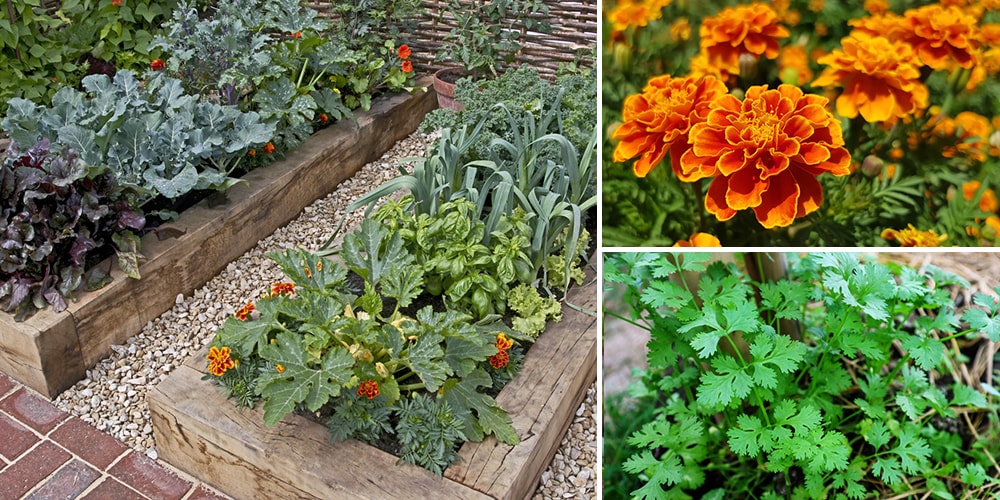
Stop Planting These Herbs Together!
If you have a small garden, growing plants next to each other is a viable idea to save space. Think about having your very own herbal and edible garden that will cater to your medicinal and cooking needs. But the setup is not always as practicable as you think it is.
Some companion plants coexist and help each other thrive. They help deter pests and somehow improve the other plant’s taste. Take basil and pepper, for example, and how they enhance their flavor when planted near each other.
However, there are certain veggies and herbs that are not ideal to grow together. These incompatible plants have different environmental needs like light and water. Some others compete for resources or attract pests that are detrimental to the companion plants.
Consider the following plant growth behaviors that do not go well together as a basic rule:
- Tall vs. short plants
- Shade vs. sun-loving
- Moist vs. dry-thriving
- Scrambling plants
- Plants susceptible to the same disease
- Allelopathic plants
What Are Allelopathic Plants?
Allelopathic plants are plants that produce chemicals that interfere with others’ growth. They can cause stunted growth or even kill neighboring plants and limit their germination. Think of it as their natural survival mechanism by suppressing fungal pathogens around them. They excrete these chemicals often through natural decomposition.
Broccoli can be allelopathic to later-planted broccoli or any other crops in the brassica family. Walnut is also incompatible with many garden plants because it produces hydro-juglone that turns toxic upon soil and air exposure. The decomposing parts of walnuts suppress the growth of many plants like tomatoes, eggplants, potatoes and peppers.
Incompatible Plants
If you want your plant community to thrive at its healthiest, it is good to know what goes well and bad with them. It will save you from trouble controlling pests and keeping their growth. Check out this list of plants that you cannot grow near each other.
Garlic & Legumes
Garlic bulb is an indispensable spice and medicinal herb that is worth keeping in the garden. Homegrown garlic goes well with many companion plants. Garlic gives off sulfur which is a natural fungicide that deters aphids in garden plants.
But garlic is not a very good neighbor for legumes like beans and peas. Sulfur buildup in the soil depletes the beans from the nutrients that it needs. It will result in stunted growth and smaller roots in legumes. And for the same reason, asparagus, sage and parsley will also suffer near garlic.
Cilantro & Fennel
Fennel and cilantro are members of the parsley family that do not merge well together. Even when cooking, these two strong flavors are a little too overpowering a combination for a dish. In the garden, fennel and cilantro compete for nutrients and both plants will end up with stunted growth.
Fennel is not very friendly with most garden plants as it attracts insects beneficial to itself and harmful to others. In the end, fennel will triumph and kill cilantro and other plants completely.
Cucumber & Basil
Cucumber is made up of 96% water, the highest percentage there is in any food. This creeping vine can choke nearby plants. When planted near aromatic herbs like basil, cucumber reduces its own yield and alters its taste. It will suck up the flavor of basil and result in an odd taste. Cucumber also does not pair well with sage, rosemary and other strong aromatics.
If there is one herb that cucumber can tolerate, it is probably the dill. Dill attracts pollinators for the cucumber and wards off harmful pests like aphids and mites.
Dill & Tomatoes
Dill and tomatoes grow well with many garden plants except near each other. When they are still young, dill helps tomatoes by repelling aphids and attracting predators of the tomato hornworm. However, as the dill matures and gets ready to seed, it will begin to inhibit the tomato’s growth.
Tomatoes will bear fruit for roughly around 113 to 150 days. Dill, on the other hand, matures in only 90 days. Thus, it is not very viable for the tomato to grow to its fruiting stage when it is planted near dill.
Dill & Carrots
Carrots and other members of the Umbellifer family like angelica and caraway are incompatible with dill. When planted near carrots, dill invites a host of carrot flies that prey on carrots. It also cross-pollinates with it and results in a poor-tasting hybrid of both plants.
Marigold & Beans
Marigold is a natural pest-repellent favored by many gardeners. It is also a good herbicide that repels many types of weeds. Marigolds exist by themselves without competing for space and nutrients.
But marigold is allelopathic and inhibits the growth of beans when planted in the same spot within two years. It does prevent beetle damage in beans, but it doesn’t help that marigolds stunt their growth resulting in lower yield.
Tomatoes & Corn
Tomatoes and corn are hardy crops that tolerate a variety of growing conditions. But when planted together, both plants attract the same insects like the tomato fruit worm and corn earworm. Neither one benefits and repels the intruders and the pests can proliferate. It will cause extensive damage that will eventually kill both plants.
Eggplant & Corn
Eggplant is a good neighbor for many veggies because it helps in loosening the soil, deterring pests and attracting pollinators. In some farms, it is common for cornfields to be planted with eggplant along the borders. But it is only beneficial in a strategic position or location. As the corn grows, it tends to overshadow the eggplant. Unfortunately, eggplant does not thrive well in shade and the obstruction stunts it and delimits its production.
Brassicas & Pepper
Members of the Brassica family like broccoli, Brussels sprouts and cabbage are not good companion plants to pepper. These plants are heavy feeders and compete for soil nutrients and resources. They also have slightly different soil needs. Peppers favor a slightly acidic medium while broccoli thrives best in alkaline soil.
Pepper, eggplant, tomatoes and potatoes are some of the members of the nightshade family that do not grow well together. These plants do not have a negative effect on each other and often share the same growing conditions. The problem is that they share the same bacterial and fungal diseases. When infected, it will only decimate the garden faster than each plant can flourish.
Celery & Carrots
Celery and carrots complete a salad platter but are not good neighbors in the garden. They both need water and shade that prevents their roots drying out. While short and tall plants generally do not fare very well, celery and carrots both seek a taller and leafy companion. Thus, beans and thyme may be the ideal companion to celery or carrot.
⇒ Vegetables You Can Stockpile Without Refrigeration For A Full Year (Video)
Carrots & Parsnips
Parsnips and carrots are two root crops that share a similar growing requirement. And because of that, they compete for space and nutrients to enable their tubers to grow. When planted near each other, expect to have smaller produce. These plants are also susceptible to the same pest – the carrot root fly. To prevent these from proliferating, space parsnips and carrots by lining them with round radishes. Radish has a fast maturity that will leave ample space between the crops after its harvest.
Potato & Sunflower
It may seem like they will never interfere with each other because potatoes grow underground and sunflowers boastfully tower up. However, these two plants are incompatible for growing side by side. Sunflower is allelopathic and its toxic ingredients affect the potato resulting in misshapen and small tubers. For a better yield, grow spinach with potatoes and let the sunflowers coexist with corn instead.
Pumpkin & Zucchini
Pumpkin and zucchini are aggressive growers that compete for nutrients, water and space. Pumpkins are likely to choke zucchini and other summer squash when grown together. They both belong to the Cucurbita family that may cross-pollinate with each other. It will result in an inferior hybrid that affects the quality and amount of harvest as well as its taste.
Black Walnut Tree
Black walnut (Juglans nigra) is an abundant tree valued for its nuts, wood and tincture. Unfortunately, the tree is allelopathic and plants cannot grow under its canopy and over its root. It releases a non-toxic chemical hydrojuglone that oxidizes into the toxic juglone. Juglone remains toxic for several years even after the tree is gone. So, while Black Walnut is aesthetically beautiful, think twice about planting one near your garden.
The Bottom Line
Companion plants are beneficial for creating a lush and healthy garden. The right plant mixes help each other coexist healthily by deterring pests and inviting pollinators. Their roots also loosen compacted soil and keep it moist for the neighboring plant to thrive.
However, picking the wrong plant combination can be problematic. Incompatible plants risk choking and imparting toxic chemicals to a nearby plant. The pests that it attracts may also be detrimental to others. So before sowing, always check about the plant compatibility to save you time and effort. Do not tend a garden that will only end up being nibbled by insects or stunted by its companion.

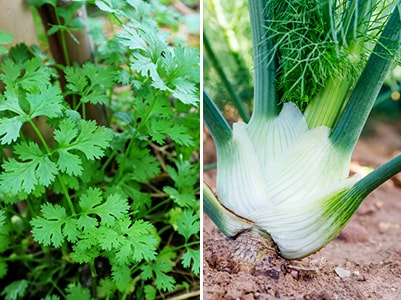
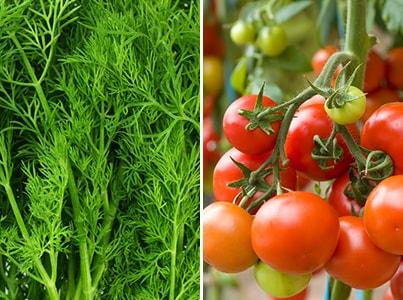
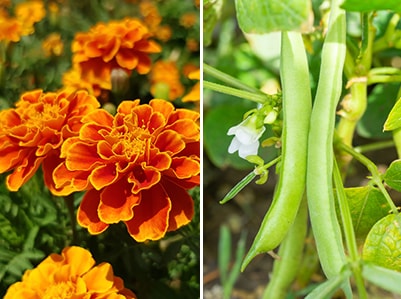
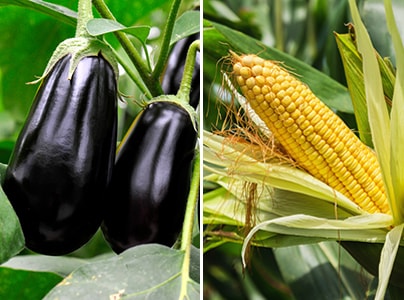
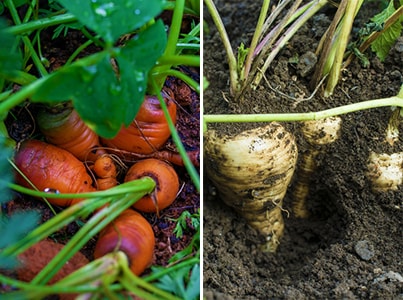
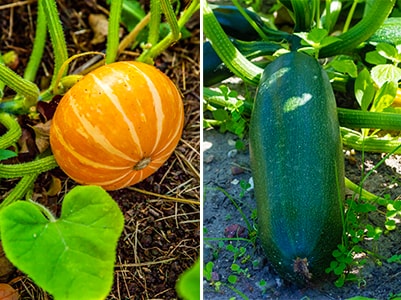
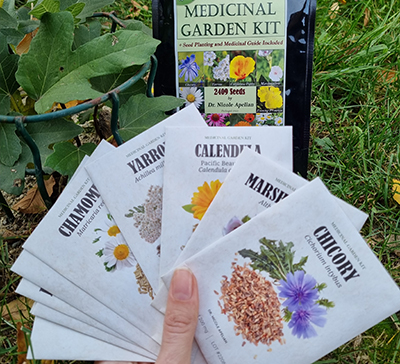
Another nice article Nicole. Yours are the only newsletter articles I read regularly. I also have your Foraging book and Herbal medicine book. Both are spectacular. My wife and I deeply appreciate your efforts and expertise.
So useful! Wonderful research! Love it. 😊🙏
GOod info. I often read about what to plant together, but not what not to.
Great article and very important information. I remember that my grandma usesd to plant garlic in her roses and told me about importance of using one plant to help another grow. I remember that peonies atract ants that help them to open up the flowers. Very interesting information, thank you Nicole.
Can you make a chart that groups plants that can be grown together?
Hey Nicole my boyfriend suffers from Fibromalagia. And he has body pain that he has times it bring tears to his eyes. Is there any plant(s) that I can use to help him.
For any inflammation in the body: place your bare feet on Dirt, sand, or grass for 30 minutes twice a day. It is by God’s design, the earth has a negative charge and will cancel out free radicals in your body, to reduce inflammation, the source of pain.
For more info check out the movie on earthinginstitute.net
Thanks for this wonderful article! There’s definitely a few mistakes I’ve been making. I would add sunflowers to the list of plants that don’t play well with others. As noted above, they’re allelopathic, so it isn’t just potatoes they shouldn’t be planted with. I always grow them in a separate bed. I also place those little plastic cages that cherry tomatoes come in over the seeds because mice love to nibble & steal those seeds! As soon as the seed has sent up its shoot, I remove the cage.
Some interesting info here, thanks. You might want to read about “the 3 sisters (corn, beans and squash) by Robin Wall Kimmerer in “Braiding Sweetgrass” about the indigenous practice of growing these 3 plants together which contradicts some of your suggestions. Sun and shade loving together, tall and short together, etc, so that they each support the other’s needs. Thank you!
What ARE the compatible plants?
Another article said planting tomatoes near chili peppers was “good”… you say they aren’t… who’s correct??
Thank you!
Your marigold looks to me like tagetes. Perhaps in America it is called differently?
you are a gift to humanity…. thank you for making articles that are ACTUALLY useful informative and not a complete waste of time.
Thanks, I didn’t know this info! You’re the best!